The Link Between Parenting and Prosocial Behaviour in Children: Essay
VerifiedAdded on 2023/06/03
|7
|1331
|387
Essay
AI Summary
This essay delves into the concept of prosocial behavior, examining its integral role in human psychology and child development. It explores various aspects, including helping, sharing, and cooperation, and investigates the critical research question: 'Is there a strong link between positive parenting behavior and the prosocial behavior development among children?' The essay presents a comprehensive literature review, analyzing articles from sources like the Alexander college library. The review chronologically examines studies focusing on parental warmth, hostility, and their impact on adolescents' prosocial behavior, the reciprocal relationship between parenting dimensions and child behavior, the influence of temperament and parenting in different cultural settings, and the moderating effect of shyness on the association between parenting and prosocial behavior. The conclusion emphasizes the significant influence of parenting styles on prosocial behavior development, while acknowledging the impact of children's nature. The essay highlights the need for further research to categorize the diverse impacts of different parenting styles on prosocial behavior.
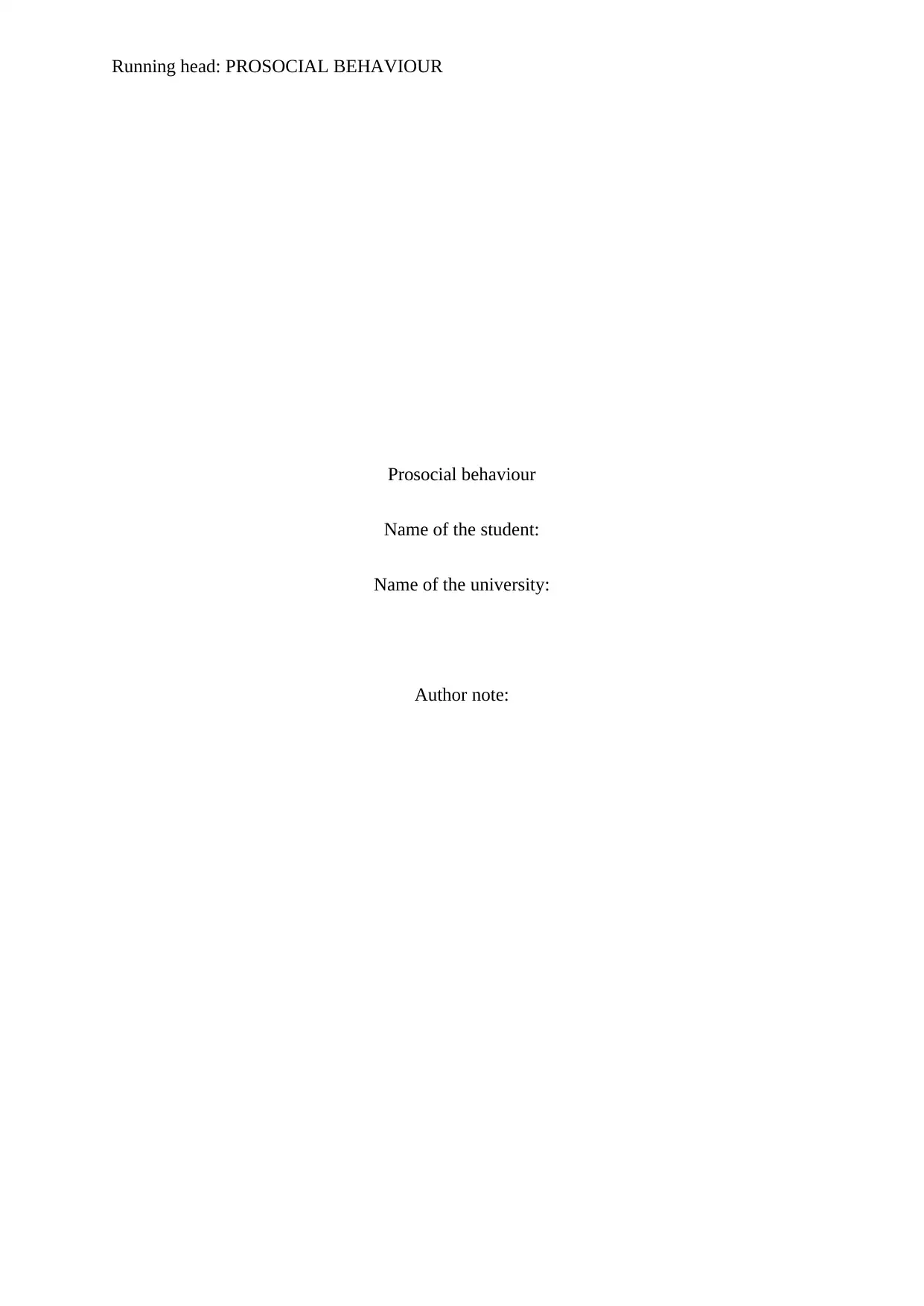
Running head: PROSOCIAL BEHAVIOUR
Prosocial behaviour
Name of the student:
Name of the university:
Author note:
Prosocial behaviour
Name of the student:
Name of the university:
Author note:
Paraphrase This Document
Need a fresh take? Get an instant paraphrase of this document with our AI Paraphraser
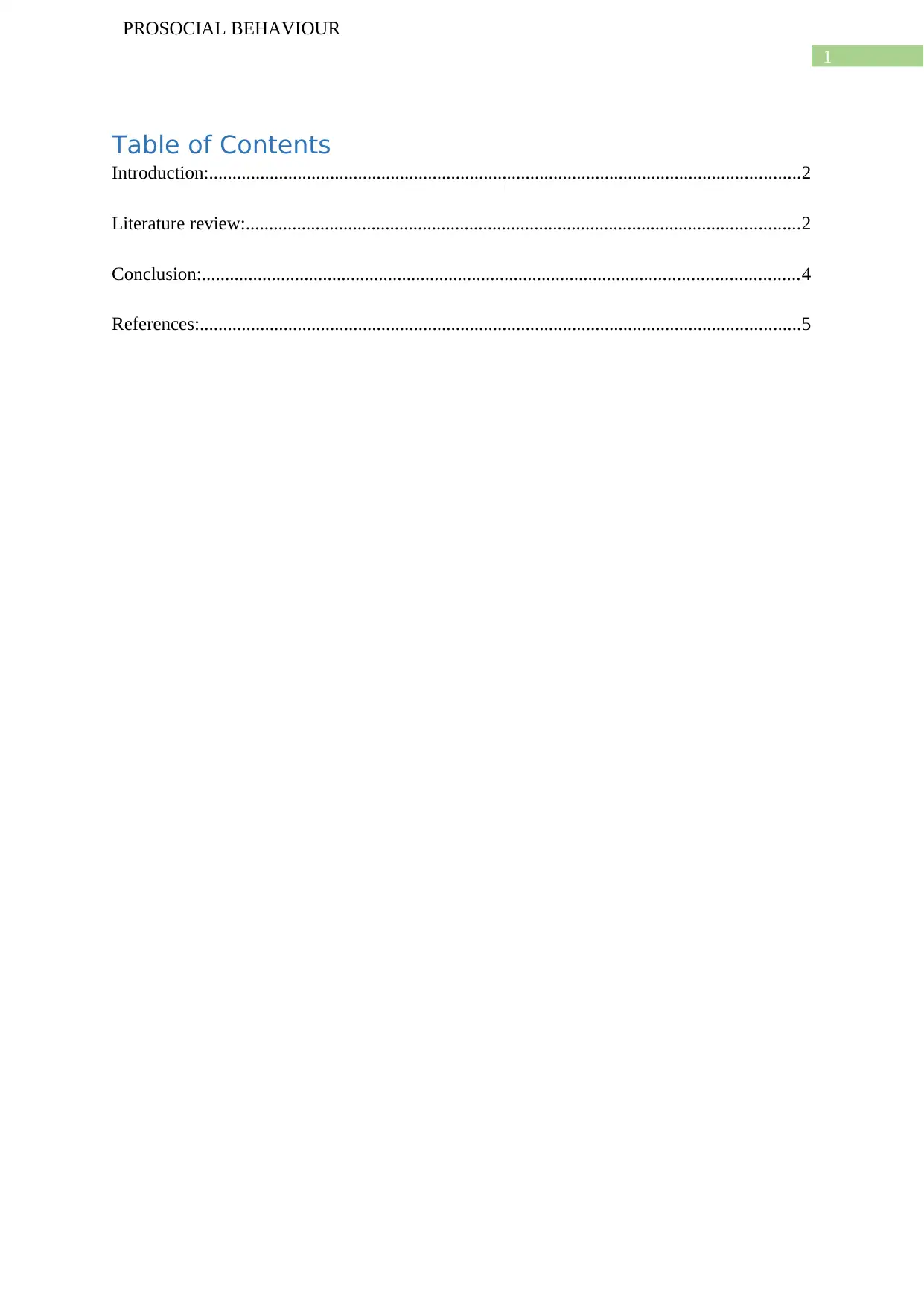
1
PROSOCIAL BEHAVIOUR
Table of Contents
Introduction:...............................................................................................................................2
Literature review:.......................................................................................................................2
Conclusion:................................................................................................................................4
References:.................................................................................................................................5
PROSOCIAL BEHAVIOUR
Table of Contents
Introduction:...............................................................................................................................2
Literature review:.......................................................................................................................2
Conclusion:................................................................................................................................4
References:.................................................................................................................................5
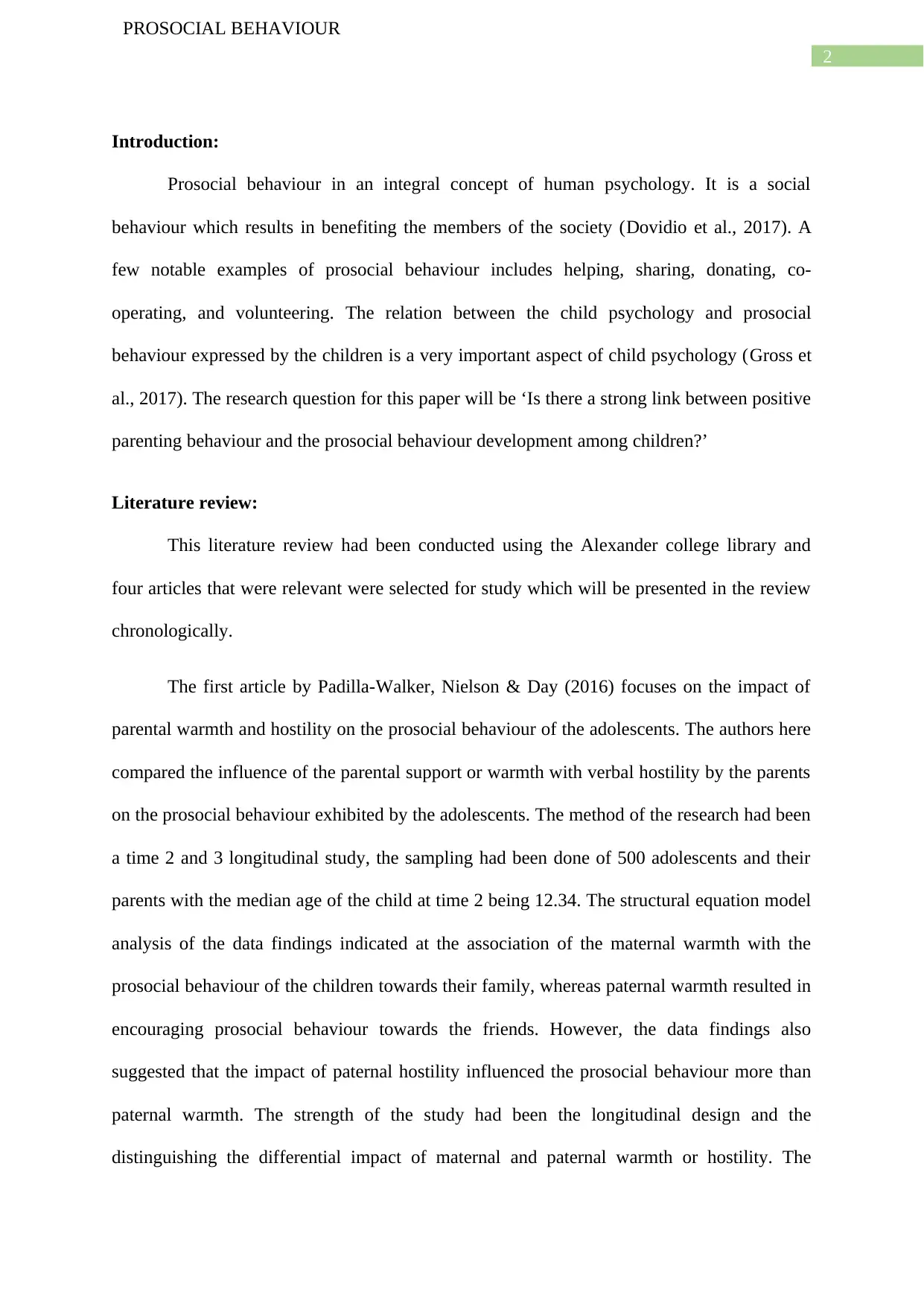
2
PROSOCIAL BEHAVIOUR
Introduction:
Prosocial behaviour in an integral concept of human psychology. It is a social
behaviour which results in benefiting the members of the society (Dovidio et al., 2017). A
few notable examples of prosocial behaviour includes helping, sharing, donating, co-
operating, and volunteering. The relation between the child psychology and prosocial
behaviour expressed by the children is a very important aspect of child psychology (Gross et
al., 2017). The research question for this paper will be ‘Is there a strong link between positive
parenting behaviour and the prosocial behaviour development among children?’
Literature review:
This literature review had been conducted using the Alexander college library and
four articles that were relevant were selected for study which will be presented in the review
chronologically.
The first article by Padilla-Walker, Nielson & Day (2016) focuses on the impact of
parental warmth and hostility on the prosocial behaviour of the adolescents. The authors here
compared the influence of the parental support or warmth with verbal hostility by the parents
on the prosocial behaviour exhibited by the adolescents. The method of the research had been
a time 2 and 3 longitudinal study, the sampling had been done of 500 adolescents and their
parents with the median age of the child at time 2 being 12.34. The structural equation model
analysis of the data findings indicated at the association of the maternal warmth with the
prosocial behaviour of the children towards their family, whereas paternal warmth resulted in
encouraging prosocial behaviour towards the friends. However, the data findings also
suggested that the impact of paternal hostility influenced the prosocial behaviour more than
paternal warmth. The strength of the study had been the longitudinal design and the
distinguishing the differential impact of maternal and paternal warmth or hostility. The
PROSOCIAL BEHAVIOUR
Introduction:
Prosocial behaviour in an integral concept of human psychology. It is a social
behaviour which results in benefiting the members of the society (Dovidio et al., 2017). A
few notable examples of prosocial behaviour includes helping, sharing, donating, co-
operating, and volunteering. The relation between the child psychology and prosocial
behaviour expressed by the children is a very important aspect of child psychology (Gross et
al., 2017). The research question for this paper will be ‘Is there a strong link between positive
parenting behaviour and the prosocial behaviour development among children?’
Literature review:
This literature review had been conducted using the Alexander college library and
four articles that were relevant were selected for study which will be presented in the review
chronologically.
The first article by Padilla-Walker, Nielson & Day (2016) focuses on the impact of
parental warmth and hostility on the prosocial behaviour of the adolescents. The authors here
compared the influence of the parental support or warmth with verbal hostility by the parents
on the prosocial behaviour exhibited by the adolescents. The method of the research had been
a time 2 and 3 longitudinal study, the sampling had been done of 500 adolescents and their
parents with the median age of the child at time 2 being 12.34. The structural equation model
analysis of the data findings indicated at the association of the maternal warmth with the
prosocial behaviour of the children towards their family, whereas paternal warmth resulted in
encouraging prosocial behaviour towards the friends. However, the data findings also
suggested that the impact of paternal hostility influenced the prosocial behaviour more than
paternal warmth. The strength of the study had been the longitudinal design and the
distinguishing the differential impact of maternal and paternal warmth or hostility. The
⊘ This is a preview!⊘
Do you want full access?
Subscribe today to unlock all pages.

Trusted by 1+ million students worldwide
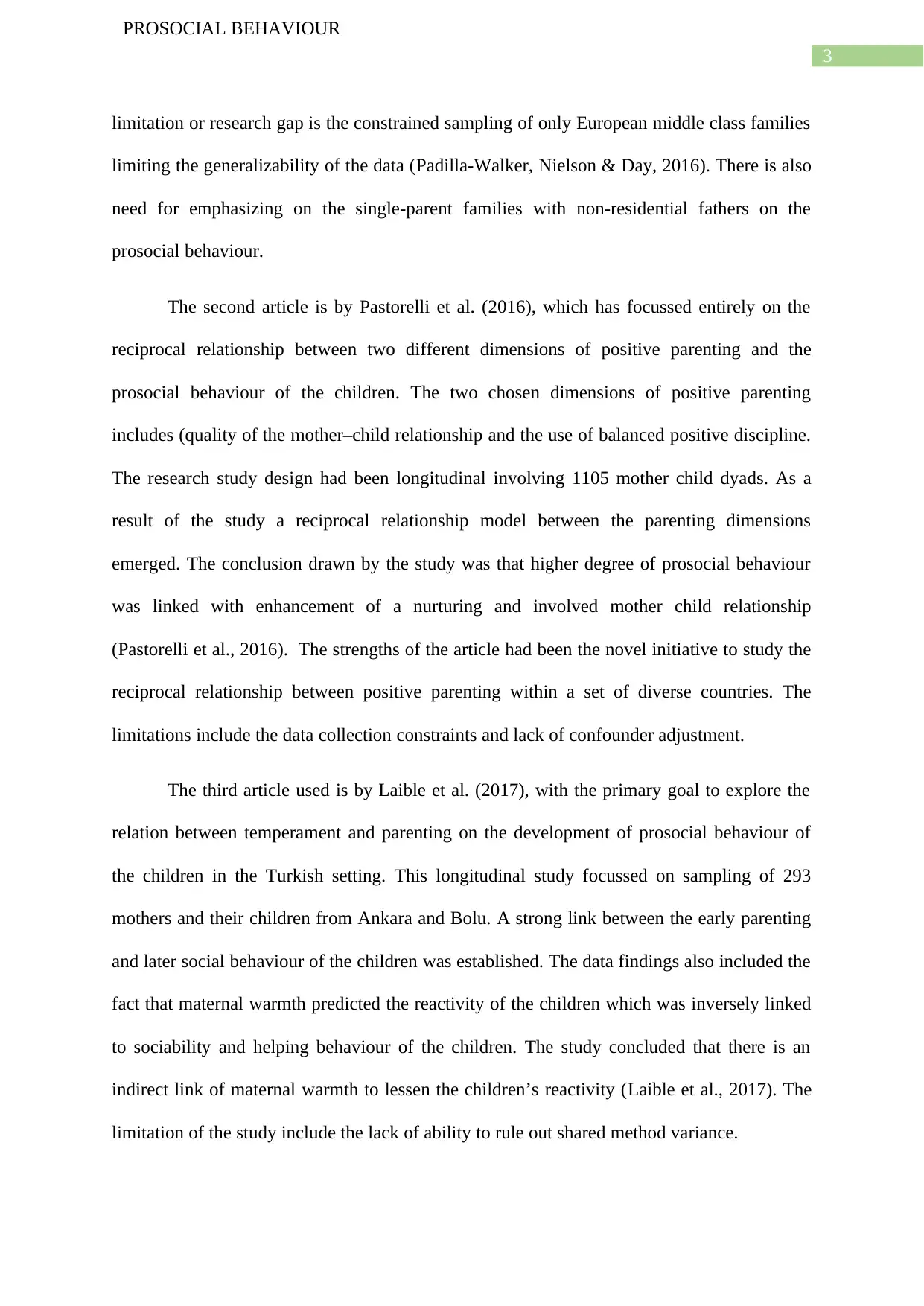
3
PROSOCIAL BEHAVIOUR
limitation or research gap is the constrained sampling of only European middle class families
limiting the generalizability of the data (Padilla-Walker, Nielson & Day, 2016). There is also
need for emphasizing on the single-parent families with non-residential fathers on the
prosocial behaviour.
The second article is by Pastorelli et al. (2016), which has focussed entirely on the
reciprocal relationship between two different dimensions of positive parenting and the
prosocial behaviour of the children. The two chosen dimensions of positive parenting
includes (quality of the mother–child relationship and the use of balanced positive discipline.
The research study design had been longitudinal involving 1105 mother child dyads. As a
result of the study a reciprocal relationship model between the parenting dimensions
emerged. The conclusion drawn by the study was that higher degree of prosocial behaviour
was linked with enhancement of a nurturing and involved mother child relationship
(Pastorelli et al., 2016). The strengths of the article had been the novel initiative to study the
reciprocal relationship between positive parenting within a set of diverse countries. The
limitations include the data collection constraints and lack of confounder adjustment.
The third article used is by Laible et al. (2017), with the primary goal to explore the
relation between temperament and parenting on the development of prosocial behaviour of
the children in the Turkish setting. This longitudinal study focussed on sampling of 293
mothers and their children from Ankara and Bolu. A strong link between the early parenting
and later social behaviour of the children was established. The data findings also included the
fact that maternal warmth predicted the reactivity of the children which was inversely linked
to sociability and helping behaviour of the children. The study concluded that there is an
indirect link of maternal warmth to lessen the children’s reactivity (Laible et al., 2017). The
limitation of the study include the lack of ability to rule out shared method variance.
PROSOCIAL BEHAVIOUR
limitation or research gap is the constrained sampling of only European middle class families
limiting the generalizability of the data (Padilla-Walker, Nielson & Day, 2016). There is also
need for emphasizing on the single-parent families with non-residential fathers on the
prosocial behaviour.
The second article is by Pastorelli et al. (2016), which has focussed entirely on the
reciprocal relationship between two different dimensions of positive parenting and the
prosocial behaviour of the children. The two chosen dimensions of positive parenting
includes (quality of the mother–child relationship and the use of balanced positive discipline.
The research study design had been longitudinal involving 1105 mother child dyads. As a
result of the study a reciprocal relationship model between the parenting dimensions
emerged. The conclusion drawn by the study was that higher degree of prosocial behaviour
was linked with enhancement of a nurturing and involved mother child relationship
(Pastorelli et al., 2016). The strengths of the article had been the novel initiative to study the
reciprocal relationship between positive parenting within a set of diverse countries. The
limitations include the data collection constraints and lack of confounder adjustment.
The third article used is by Laible et al. (2017), with the primary goal to explore the
relation between temperament and parenting on the development of prosocial behaviour of
the children in the Turkish setting. This longitudinal study focussed on sampling of 293
mothers and their children from Ankara and Bolu. A strong link between the early parenting
and later social behaviour of the children was established. The data findings also included the
fact that maternal warmth predicted the reactivity of the children which was inversely linked
to sociability and helping behaviour of the children. The study concluded that there is an
indirect link of maternal warmth to lessen the children’s reactivity (Laible et al., 2017). The
limitation of the study include the lack of ability to rule out shared method variance.
Paraphrase This Document
Need a fresh take? Get an instant paraphrase of this document with our AI Paraphraser
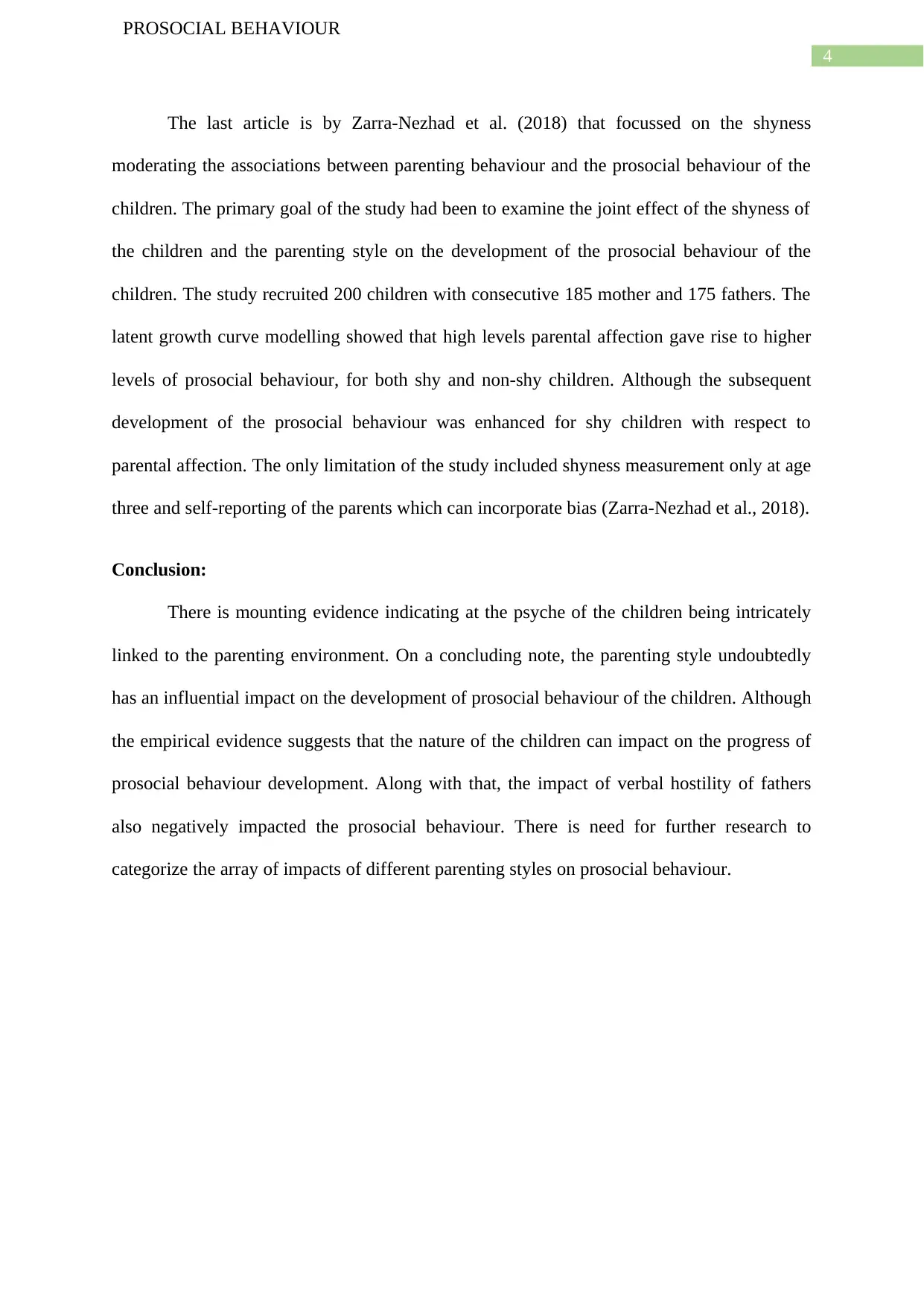
4
PROSOCIAL BEHAVIOUR
The last article is by Zarra-Nezhad et al. (2018) that focussed on the shyness
moderating the associations between parenting behaviour and the prosocial behaviour of the
children. The primary goal of the study had been to examine the joint effect of the shyness of
the children and the parenting style on the development of the prosocial behaviour of the
children. The study recruited 200 children with consecutive 185 mother and 175 fathers. The
latent growth curve modelling showed that high levels parental affection gave rise to higher
levels of prosocial behaviour, for both shy and non-shy children. Although the subsequent
development of the prosocial behaviour was enhanced for shy children with respect to
parental affection. The only limitation of the study included shyness measurement only at age
three and self-reporting of the parents which can incorporate bias (Zarra-Nezhad et al., 2018).
Conclusion:
There is mounting evidence indicating at the psyche of the children being intricately
linked to the parenting environment. On a concluding note, the parenting style undoubtedly
has an influential impact on the development of prosocial behaviour of the children. Although
the empirical evidence suggests that the nature of the children can impact on the progress of
prosocial behaviour development. Along with that, the impact of verbal hostility of fathers
also negatively impacted the prosocial behaviour. There is need for further research to
categorize the array of impacts of different parenting styles on prosocial behaviour.
PROSOCIAL BEHAVIOUR
The last article is by Zarra-Nezhad et al. (2018) that focussed on the shyness
moderating the associations between parenting behaviour and the prosocial behaviour of the
children. The primary goal of the study had been to examine the joint effect of the shyness of
the children and the parenting style on the development of the prosocial behaviour of the
children. The study recruited 200 children with consecutive 185 mother and 175 fathers. The
latent growth curve modelling showed that high levels parental affection gave rise to higher
levels of prosocial behaviour, for both shy and non-shy children. Although the subsequent
development of the prosocial behaviour was enhanced for shy children with respect to
parental affection. The only limitation of the study included shyness measurement only at age
three and self-reporting of the parents which can incorporate bias (Zarra-Nezhad et al., 2018).
Conclusion:
There is mounting evidence indicating at the psyche of the children being intricately
linked to the parenting environment. On a concluding note, the parenting style undoubtedly
has an influential impact on the development of prosocial behaviour of the children. Although
the empirical evidence suggests that the nature of the children can impact on the progress of
prosocial behaviour development. Along with that, the impact of verbal hostility of fathers
also negatively impacted the prosocial behaviour. There is need for further research to
categorize the array of impacts of different parenting styles on prosocial behaviour.
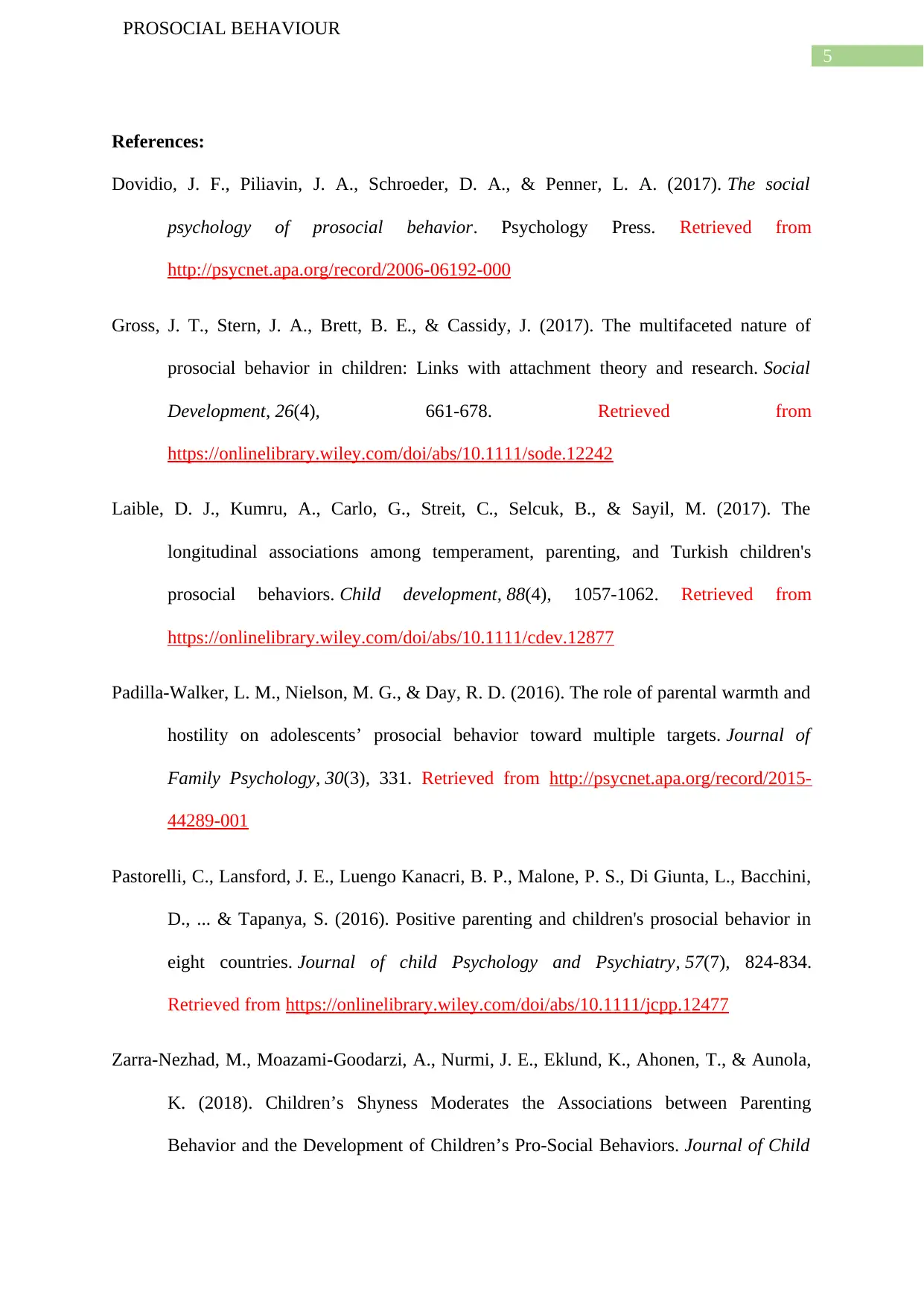
5
PROSOCIAL BEHAVIOUR
References:
Dovidio, J. F., Piliavin, J. A., Schroeder, D. A., & Penner, L. A. (2017). The social
psychology of prosocial behavior. Psychology Press. Retrieved from
http://psycnet.apa.org/record/2006-06192-000
Gross, J. T., Stern, J. A., Brett, B. E., & Cassidy, J. (2017). The multifaceted nature of
prosocial behavior in children: Links with attachment theory and research. Social
Development, 26(4), 661-678. Retrieved from
https://onlinelibrary.wiley.com/doi/abs/10.1111/sode.12242
Laible, D. J., Kumru, A., Carlo, G., Streit, C., Selcuk, B., & Sayil, M. (2017). The
longitudinal associations among temperament, parenting, and Turkish children's
prosocial behaviors. Child development, 88(4), 1057-1062. Retrieved from
https://onlinelibrary.wiley.com/doi/abs/10.1111/cdev.12877
Padilla-Walker, L. M., Nielson, M. G., & Day, R. D. (2016). The role of parental warmth and
hostility on adolescents’ prosocial behavior toward multiple targets. Journal of
Family Psychology, 30(3), 331. Retrieved from http://psycnet.apa.org/record/2015-
44289-001
Pastorelli, C., Lansford, J. E., Luengo Kanacri, B. P., Malone, P. S., Di Giunta, L., Bacchini,
D., ... & Tapanya, S. (2016). Positive parenting and children's prosocial behavior in
eight countries. Journal of child Psychology and Psychiatry, 57(7), 824-834.
Retrieved from https://onlinelibrary.wiley.com/doi/abs/10.1111/jcpp.12477
Zarra-Nezhad, M., Moazami-Goodarzi, A., Nurmi, J. E., Eklund, K., Ahonen, T., & Aunola,
K. (2018). Children’s Shyness Moderates the Associations between Parenting
Behavior and the Development of Children’s Pro-Social Behaviors. Journal of Child
PROSOCIAL BEHAVIOUR
References:
Dovidio, J. F., Piliavin, J. A., Schroeder, D. A., & Penner, L. A. (2017). The social
psychology of prosocial behavior. Psychology Press. Retrieved from
http://psycnet.apa.org/record/2006-06192-000
Gross, J. T., Stern, J. A., Brett, B. E., & Cassidy, J. (2017). The multifaceted nature of
prosocial behavior in children: Links with attachment theory and research. Social
Development, 26(4), 661-678. Retrieved from
https://onlinelibrary.wiley.com/doi/abs/10.1111/sode.12242
Laible, D. J., Kumru, A., Carlo, G., Streit, C., Selcuk, B., & Sayil, M. (2017). The
longitudinal associations among temperament, parenting, and Turkish children's
prosocial behaviors. Child development, 88(4), 1057-1062. Retrieved from
https://onlinelibrary.wiley.com/doi/abs/10.1111/cdev.12877
Padilla-Walker, L. M., Nielson, M. G., & Day, R. D. (2016). The role of parental warmth and
hostility on adolescents’ prosocial behavior toward multiple targets. Journal of
Family Psychology, 30(3), 331. Retrieved from http://psycnet.apa.org/record/2015-
44289-001
Pastorelli, C., Lansford, J. E., Luengo Kanacri, B. P., Malone, P. S., Di Giunta, L., Bacchini,
D., ... & Tapanya, S. (2016). Positive parenting and children's prosocial behavior in
eight countries. Journal of child Psychology and Psychiatry, 57(7), 824-834.
Retrieved from https://onlinelibrary.wiley.com/doi/abs/10.1111/jcpp.12477
Zarra-Nezhad, M., Moazami-Goodarzi, A., Nurmi, J. E., Eklund, K., Ahonen, T., & Aunola,
K. (2018). Children’s Shyness Moderates the Associations between Parenting
Behavior and the Development of Children’s Pro-Social Behaviors. Journal of Child
⊘ This is a preview!⊘
Do you want full access?
Subscribe today to unlock all pages.

Trusted by 1+ million students worldwide
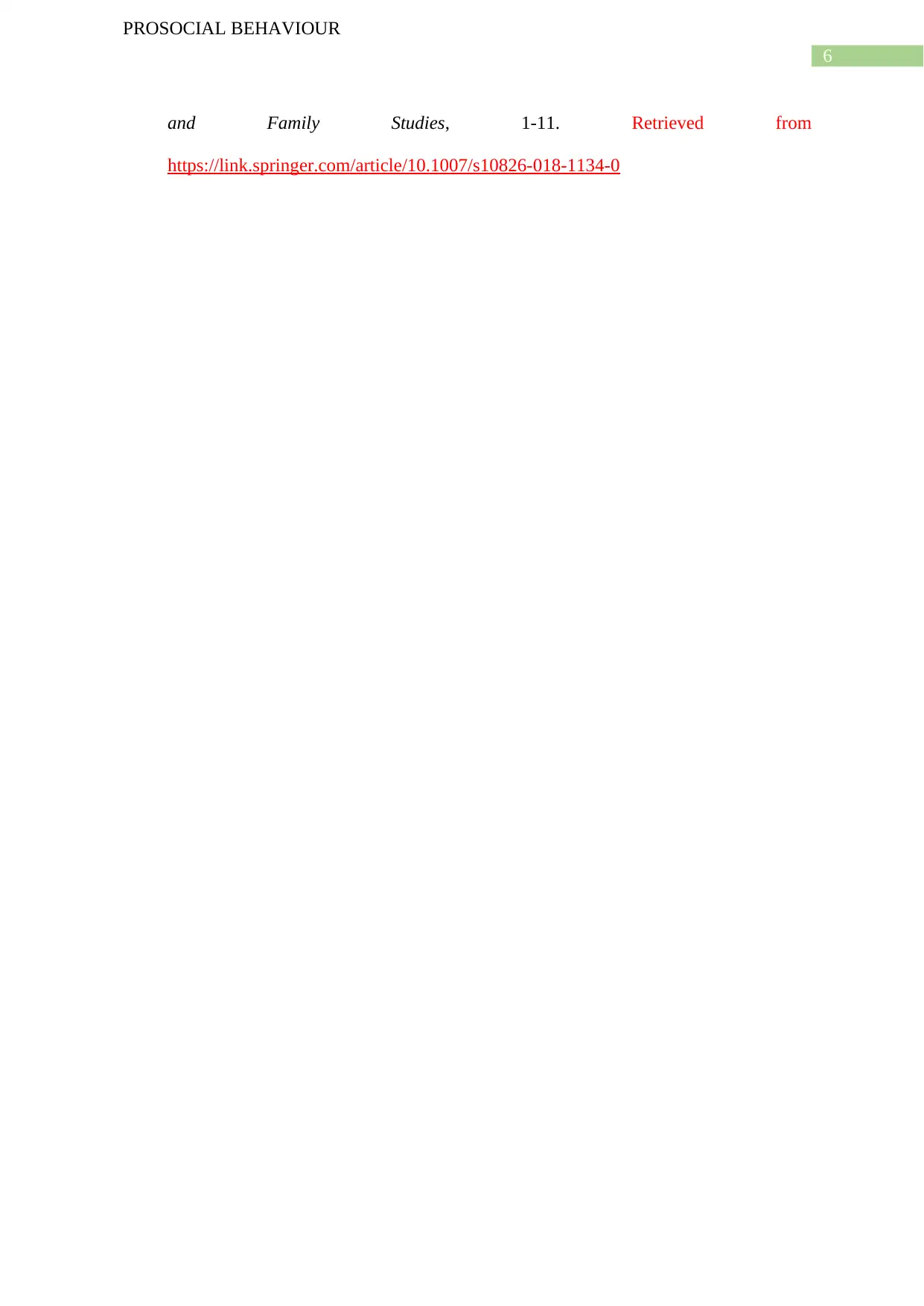
6
PROSOCIAL BEHAVIOUR
and Family Studies, 1-11. Retrieved from
https://link.springer.com/article/10.1007/s10826-018-1134-0
PROSOCIAL BEHAVIOUR
and Family Studies, 1-11. Retrieved from
https://link.springer.com/article/10.1007/s10826-018-1134-0
1 out of 7
Your All-in-One AI-Powered Toolkit for Academic Success.
+13062052269
info@desklib.com
Available 24*7 on WhatsApp / Email
![[object Object]](/_next/static/media/star-bottom.7253800d.svg)
Unlock your academic potential
Copyright © 2020–2025 A2Z Services. All Rights Reserved. Developed and managed by ZUCOL.

